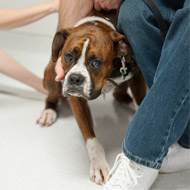
Retailer urged to include “don’t try this at home” message
The BVA has written to John Lewis expressing concern over its 2016 Christmas advert.
Starring a boxer dog jumping on a trampoline, ‘Buster the Boxer' has already had millions of views on social media and generated much attention - both good and bad.
As soon as the advert aired, BVA president Gudrun Ravetz tweeted the retailer asking: 'please say ‘don’t try this at home’. Seen awful dog/trampoline injuries in vet practice #bustertheboxer.’
But with no response from Twitter, the BVA compiled a letter to John Lewis’s communications team. Signed by Gudrun Ravetz, the letter highlights serious injuries that can result from dogs being placed or jumping onto trampolines.
It reads: ‘We are concerned that your advert may cause many people to copy such behaviours with their own pet.
'Whilst we appreciate the feel-good sentiment the advert is trying to convey, and that it is intended to be whimsical, in reality, vets - including myself have seen a wide range of injuries to dogs as a result of being on a trampoline, from leg breaks to ligament damage.’
The letter adds: 'On seeing Buster have fun on the trampoline many owners may want their pets to experience this also, without being aware of the damage it could do or visits to the vet that could ensue. We suggest that a light-hearted “do not try this at home” message should be issued to accompany this campaign.’
In the letter, the BVA also calls on John Lewis and other brands to use animals- real or CGI - responsibly in all campaigns to ensure their welfare.
‘Veterinary organisations and animal welfare charities work very hard to promote messages about responsible pet ownership and adverts, such as this one, with huge audiences can undermine this work,’ the letter continues.
‘BVA is always happy to offer advice on commercial campaigns involving animals to ensure their welfare is being considered and ensured.'
In response to the letter, a John Lewis spokesperson said: “The trampoline scenes were created using CGI and no animals were placed on a trampoline during the making of our advert. Animal safety is also important to us and we hope that people will appreciate that real animals wouldn’t actually play like this. Feedback overwhelmingly suggests they do.
“On our website where we sell trampolines we have safety information which includes advice not to put animals on them.”



 The Veterinary Medicines Directorate (VMD) is inviting applications from veterinary students to attend a one-week extramural studies (EMS) placement in July 2026.
The Veterinary Medicines Directorate (VMD) is inviting applications from veterinary students to attend a one-week extramural studies (EMS) placement in July 2026.